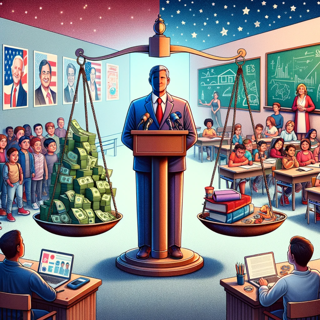December 2023
Imagine a world where billions in campaign funds are invested in education instead. Join me as we explore the potential transformation of American society if even a fraction of the $14 billion spent on the 2020 campaign were allocated to educational development. The article highlights the stark disparities in U.S. primary and secondary education, the multifaceted role of schools in communities, and the profound societal benefits of education. This thought-provoking piece challenges readers to reconsider the allocation of vast political resources, advocating for a future where investment in education takes precedence, fostering a more equitable and informed democratic society.
Last updated 20 months ago
Will publish on 06/07/2026
Investing in Futures: Redirecting Campaign Billions to Education
By Monica Granlove

The United States allocated a staggering $14 billion1 for the 2020 campaign. Just envision the transformative impact if even a modest ten percent of that substantial sum were redirected toward education.
Consider the profound benefits that could be realized for all Americans if a portion of the funds currently earmarked for campaigns were invested in our education system. While the United States stands out globally for its higher education institutions, welcoming students from diverse backgrounds, the same cannot be said for primary and secondary public schools. Regrettably, disparities persist, often mirroring socioeconomic lines, with lower-class and underserved areas exhibiting lower test score averages. This puts the United States behind other countries in terms of quality education.
Schools are not merely centers for learning; they serve as crucial hubs for healthcare, social services, and nutritional support. In October 2023 the World Bank2 in October 2023 underscores the significance of education as a fundamental human right and a potent force for development. It is a linchpin for poverty reduction, improved health, gender equality, and overall societal well-being. The returns on investment in education are vast, contributing to income growth, equity, and inclusion.
Individually, education empowers people by enhancing employment prospects, increasing earnings, fostering good health, and reducing poverty. Globally, the correlation is evident, with a 9% increase in hourly earnings for each additional year of schooling. Societies benefit as well, as education propels long-term economic growth, stimulates innovation, fortifies institutions, and nurtures social cohesion.
As we ponder the exorbitant amounts spent on political campaigns, it is essential to recognize the sway of media in shaping voter perceptions. The way campaigns are covered in the media significantly influences how voters perceive candidates and the electoral process. For more information, please read the article, ‘Your Vote Counts: Learn from History.’
This prompts a fundamental question:
Must candidates expend such colossal sums to propagate their ideologies and beliefs, or could a portion of these resources be redirected to education? By investing in education, we not only prioritize the future but also trust voters to obtain the necessary information and make informed choices, fostering a more equitable and informed democratic process.
Endnotes
1CNBC:2020 Election Spending
2World Bank:On Education


